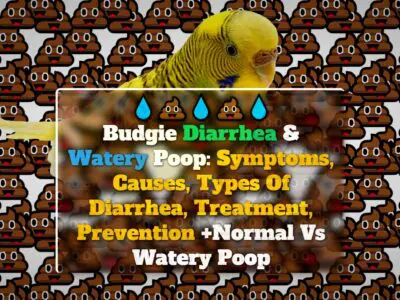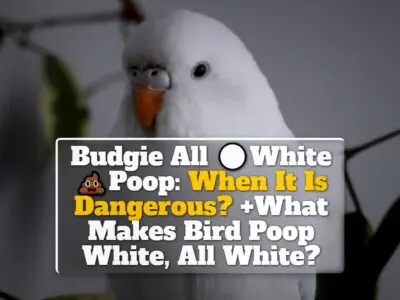Yes, budgies may eat their own poop due to a variety of reasons, such as nutritional deficiencies, malabsorption issues, environmental stress, lack of dietary fiber, boredom, or habit.
However, this behavior can lead to health risks like pathogen spread, digestive disturbances, nutritional imbalances, or infections.
Preventive measures include a balanced diet, clean environment, and veterinary care.
I remember the days when I used to keep budgies as pets, and they never failed to surprise me with their quirky behaviors.
However, one such behavior, coprophagia (budgies eating their own poop), left me somewhat confused.
So, I decided to dig deeper and find out why these charming creatures engage in such an activity.
I will share what I’ve learned with you.
What Are The Reasons Why Budgies Eat Their Own Poop?
It’s disconcerting to see our beloved budgies indulge in coprophagia, or the eating of their own poop.
While this behavior is rare in budgies, there can be multiple reasons behind it.
From nutritional deficiencies to environmental stressors, several factors can push our feathered friends to eat their own droppings.
Below, we’ll explore these reasons in more detail.
Nutritional Deficiency
Budgies have a particular need for a well-balanced diet that satisfies all their nutritional requirements.
They thrive on a variety of seeds, fruits, and vegetables.
However, if their diet is lacking in crucial nutrients, they may resort to eating their own feces as an act of survival.
This is because poop can contain traces of undigested food particles and some nutrients, and consuming it provides a second chance for the bird to extract these essential elements.
If a budgie is displaying coprophagia, it could signal an unmet need in their diet, prompting them to recycle undigested nutrients from their own feces.
Malabsorption Issues
Some budgies may struggle with the absorption of nutrients from their food due to digestive problems or other underlying health conditions.
This leads to valuable nutrients being passed out in their droppings.
To compensate for this, they might develop coprophagia, hoping to re-ingest and absorb these missed nutrients on the second pass.
This peculiar behavior can often indicate health problems related to digestion and absorption that might need medical attention.
Environmental Stress
These lively birds are quite sensitive to their surroundings.
Environmental stressors such as overcrowding, excessive noise, insufficient mental stimulation, or abrupt changes in their environment can all lead to stress and anxiety in budgies.
This stress may manifest as abnormal behaviors, including coprophagia.
By eating their own droppings, the birds may be attempting to cope with the anxiety induced by their environment.
Lack Of Dietary Fiber
Just like humans, budgies also require an adequate amount of dietary fiber for proper digestion.
A diet lacking in fiber can result in inefficient digestion and other gastrointestinal issues.
In an attempt to rectify this, budgies might consume their own droppings, which contain remnants of fiber-rich foods they’ve eaten earlier.
Hence, coprophagia in budgies could be an indicator of insufficient fiber intake and can suggest a need to tweak their diet accordingly.
Parental Behavior
In the bird kingdom, especially with budgies, parental behavior can sometimes include consuming their chick’s droppings.
This behavior is most common during the nestling stage.
The adult budgies do this to maintain the cleanliness of the nest and prevent the build-up of waste that could attract predators or cause diseases.
In some cases, young budgies may mimic this cleaning behavior, leading to instances of coprophagia.
Boredom Or Lack Of Mental Stimulation
Budgies are highly intelligent and active birds that require plenty of mental stimulation.
A lack of engaging activities, interaction, or enrichment can lead to boredom and potentially result in abnormal behaviors such as eating their own droppings.
Providing your budgie with toys, social interaction, and varied stimuli can prevent this from becoming an issue.
Habit Formation
At times, the act of consuming their own droppings might not be linked to any medical or environmental issue but simply a habit that the budgie has formed.
This is especially true for budgies that have been seen eating their own feces from a young age.
It becomes a part of their routine, and despite the owner’s best efforts, this habit formation may be challenging to break.
Underlying Health Issues, Sickness
Certain underlying health issues or sickness may also trigger coprophagia in budgies.
Diseases affecting the digestive system or nutrient absorption can lead to this behavior as the budgies try to reabsorb nutrients from their droppings.
It’s crucial to monitor your budgie’s health regularly, and any change in behavior, such as coprophagia, should warrant a visit to the vet.
Sweety Droppings May Attract Budgies
Certain types of food can result in budgies producing sweet-tasting droppings.
If the budgie’s diet is high in fruits, it could result in sweetened feces that may attract the bird to re-consume it.
The simple solution to this is to provide a balanced diet that includes a variety of foods, such as seeds, vegetables, and a moderate amount of fruits.
This will ensure that the budgie gets the necessary nutrients without making the droppings too appealing.
What Are The Negative Consequences Of Budgerigars Eating Their Own Poop?
The consumption of their own feces by budgerigars, or budgies, can lead to several negative consequences.
While it may not always indicate a serious problem, continued coprophagia should be addressed promptly to prevent potential health issues.
Spread Of Pathogens
One major concern with budgies eating their own feces is the potential for the spread of pathogens.
Feces can contain a variety of bacteria and parasites, many of which can harm the bird’s health.
When a budgie consumes its own droppings, it increases the chances of ingesting these harmful microorganisms, leading to potential infection or disease.
Digestive System Disturbances
Consuming their own droppings can also lead to disturbances in the budgie’s digestive system.
As the feces have already undergone digestion once, they may not be broken down properly the second time, causing digestive discomfort or blockages.
This could potentially result in symptoms such as a decrease in appetite, changes in droppings, or lethargy.
Nutritional Imbalances
Budgies eating their own feces may also suffer from nutritional imbalances.
Since feces are essentially waste products that the body has already absorbed the nutrients from, re-ingesting them does not provide any significant nutritional value.
Over time, if the budgie is consuming feces instead of nutritious food, it can lead to deficiencies.
Compromised Immune System
Repeated consumption of feces can potentially lead to a compromised immune system in budgies.
The bird’s body is constantly exposed to harmful bacteria present in the feces, forcing the immune system to work harder to fend off potential infections.
Over time, this can weaken the immune system, making the budgie more susceptible to other illnesses.
Increased Risk Of Bacterial Or Fungal Infections
Finally, budgies that eat their own feces have an increased risk of bacterial or fungal infections.
The warm, moist conditions of the bird’s digestive system provide an ideal environment for these organisms to grow.
If the bird is continually consuming feces laden with harmful bacteria or fungi, it increases the chances of these infections becoming established and causing disease.
Toxicity From Waste Products
A severe consequence of budgies consuming their own droppings is the potential toxicity from waste products.
Feces are the by-product of the body’s metabolic processes and contain substances that are meant to be excreted.
By re-ingesting these waste products, budgies could expose themselves to harmful toxins.
Over time, this can lead to various health issues, such as kidney or liver damage.
Behavioral Abnormalities
Budgies eating their own poop can also develop behavioral abnormalities.
For instance, this practice might indicate that the bird is bored or stressed.
Chronic stress or boredom can lead to other harmful behaviors, such as feather plucking or self-mutilation.
Furthermore, if a budgie continually eats its feces, it may develop a habit of it, which can be difficult to break.
Reduced Lifespan And Overall Health
Ultimately, all the potential health issues associated with budgies eating their own feces can lead to a reduced lifespan and overall poor health.
Chronic diseases, nutritional imbalances, and constant exposure to pathogens can all contribute to a decreased life expectancy and poor quality of life for the budgie.
How To Prevent Budgies From Eating Their Own Poop?
As a budgie owner, there are several strategies you can implement to prevent your pet bird from eating its own feces.
Ensure A Balanced Diet
One of the most important steps is to ensure a balanced diet for your budgie.
Budgies that are deficient in nutrients may resort to eating their feces in an attempt to recover lost nutrients.
Providing a diet that includes a variety of seeds, fruits, vegetables, and bird-safe grains can help prevent nutritional deficiencies and reduce the likelihood of your budgie resorting to coprophagia.
Feed High-Quality Food
It is also crucial to feed high-quality food to your budgie.
Not all bird food is created equal, and some may lack essential nutrients necessary for your budgie’s health.
High-quality bird food will be specifically formulated to meet all of your budgie’s nutritional needs, reducing the chances that your bird will attempt to get nutrients from its droppings.
Regular Cleaning Of The Cage
Keeping the cage clean is a crucial step in preventing your budgie from eating its own feces.
Budgies may come into contact with their droppings if their cage is not cleaned regularly.
Therefore, make sure to clean your budgie’s cage frequently.
This includes removing and replacing the cage liner, washing the cage bars, and cleaning the perches and toys inside.
Provide Mental Stimulation
Budgies are intelligent birds that need mental stimulation to keep them busy and prevent boredom.
Providing toys, playing with your budgie, or even teaching it tricks can help keep your budgie entertained.
The more engaged a budgie is, the less likely it is to develop undesirable behaviors like eating its droppings.
Regular Health Check-Ups
Regular health check-ups with an avian vet can help ensure that your budgie is not eating its poop due to an underlying health issue.
The vet can conduct a thorough examination of your budgie and its droppings to identify any health problems and provide appropriate treatment.
Regular vet visits can also help catch any issues early before they become serious.
Avoid Crowded Living Conditions
Crowded living conditions can cause stress in budgies and encourage poop-eating behavior.
Ensure that your budgie’s cage is large enough for it to fly and move around comfortably.
If you have multiple budgies, consider providing them with separate cages or a larger shared cage to prevent overcrowding.
Maintain A Clean And Hygienic Environment
Maintaining a clean and hygienic environment is a crucial preventive measure against budgies eating their own feces.
Provide Fresh Water
Always ensure your budgie has access to clean, fresh water.
Stale or contaminated water can lead to various health problems, including digestive issues, that could potentially encourage your budgie to eat its own feces.
Therefore, make it a point to replace your budgie’s drinking water at least once a day or more often if necessary.
Offer Appropriate Supplementation
Supplements can help balance your budgie’s diet and provide necessary nutrients that may be lacking in their primary diet.
However, it’s crucial to remember that supplements should be given in moderation and should not replace a balanced diet.
Minimize Stress And Boredom
Stress and boredom can lead to a variety of behavioral issues in budgies, including eating their own poop.
To help minimize stress and boredom, ensure your budgie has plenty of space to move around, toys to play with, and enough social interaction.
Regular training sessions can also provide mental stimulation, while maintaining a consistent daily routine can help reduce stress.
Distract And Redirect
If you observe your budgie eating its feces, a method you can employ is distraction and redirection.
This behavioral approach involves providing alternative activities to occupy your bird and draw its attention away from its poop.
For example, introduce new toys, conduct interactive play sessions, or provide fresh, stimulating foods.
Seek Veterinary Guidance
If the issue persists despite your efforts, it’s important to seek veterinary guidance.
A professional avian veterinarian can perform a thorough check-up, identify any underlying health issues causing this behavior, and provide appropriate treatment or recommendations.
Regular health checks can also help in early detection of any problems, enabling quicker intervention and treatment.
FAQs
Is It Normal For Budgies To Eat Their Poop?
While it’s not unusual for budgies to occasionally peck at their droppings out of curiosity or confusion, regular or excessive consumption of feces is not normal and could be a sign of underlying health issues or environmental stressors.
Can A Budgie Get Sick From Eating Its Own Feces?
Yes, a budgie can get sick from eating its own feces.
Consuming feces can lead to the spread of pathogens, nutritional imbalances, digestive system disturbances, and increased risk of bacterial or fungal infections.
Why Do Some Budgies Eat More Feces Than Others?
The reasons why some budgies may eat more feces than others can vary.
It may be due to nutritional deficiencies, underlying health conditions, stress, boredom, or a learned habit from their parents.
Can I Prevent My Budgie From Eating Its Own Feces?
Yes, there are several strategies to prevent your budgie from eating its own feces.
These include maintaining a balanced diet, providing high-quality food, ensuring a clean environment, increasing dietary fiber, minimizing stress and boredom, distracting and redirecting your budgie, and seeking veterinary guidance.
Why Do Budgies Eat Their Babies’ Poop?
Budgies, particularly mother budgies, engage in the behavior of eating their babies’ poop as a natural and instinctive behavior.
This behavior serves multiple purposes, including maintaining nest hygiene and preventing the accumulation of waste that could attract predators or lead to diseases.
By consuming the droppings, the parents keep the nest clean and reduce the risk of the chicks getting sick.
In addition to nest hygiene, another important reason for budgie parents to eat their babies’ poop is that the substance contains valuable nutrients.
The nestlings are not able to fully digest the food they eat, and as a result, the droppings still contain energy and nutrients that are beneficial for the parents.
By consuming the feces, the parents can extract and recycle these nutrients, allowing them to provide more of the worms and insects they find to their growing chicks.
According to Ibáñez-Álamo, an expert in avian behavior, “Parents will eat the feces because the nestlings cannot completely digest the food that they eat.
There is still energy and nutrients available in those sacs.” This behavior ensures that the parents make the most out of the available resources and maximize the transfer of nutrients from themselves to their offspring.
What Role Does A Budgie’s Diet Play In Its Tendency To Eat Poop?
A budgie’s diet significantly influences its health and behavior, including the tendency to eat poop.
A diet lacking essential nutrients or fiber can lead a budgie to consume its own feces in an attempt to obtain missing nutrients or add roughage to its diet.
Feeding your budgie a balanced diet with high-quality food, rich in necessary nutrients and fiber, can thus help deter this behavior.
How Can Stress Lead To A Budgie Eating Its Own Feces?
Environmental stress can trigger various coping mechanisms in budgies, one of which may include eating their own feces.
Stressors can range from loud noises, poor living conditions, lack of mental stimulation, to sudden changes in their environment.
By ensuring a calm, clean, and engaging environment, you can help alleviate stress in your budgie and thus prevent fecal eating.
Are There Any Health Risks For Budgies Eating Other Birds’ Poop?
Yes, budgies eating the feces of other birds can face significant health risks.
This behavior can lead to the spread of pathogens that are not present in their own fecal matter, potentially resulting in infections, digestive disturbances, and other health problems.
Therefore, it’s crucial to monitor your budgie’s interactions with other birds and their droppings.
Can Environmental Enrichment Prevent Budgies From Eating Their Own Poop?
Environmental enrichment plays a significant role in preventing this behavior.
Budgies are intelligent and active birds requiring mental stimulation and physical activity.
Providing toys, mirrors, foraging opportunities, and interaction can help deter boredom and consequently reduce the likelihood of feces eating.
How Frequently Should I Consult A Vet If My Budgie Eats Its Own Poop?
If you notice your budgie eating its feces, it’s advisable to consult a vet immediately to rule out any underlying health issues.
Once the bird is healthy, routine veterinary check-ups should be scheduled based on your vet’s recommendation, considering the bird’s age, overall health, and any specific dietary or health concerns that may arise.


